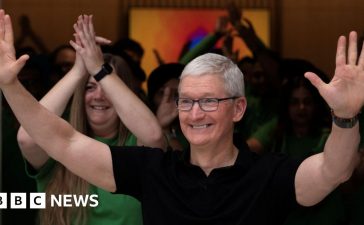Job seekers attend the JobNewsUSA.com South Florida Job Fair held at the Amerant Bank Arena in Sunrise, Florida, on June 26, 2024.
Joe Raedle | Getty Images
The unemployment rate for men in Black and Hispanic racial groups declined in September while staying little-changed for other racial groups, according to data released Friday by the Department of Labor.
In September, Black men saw their jobless rate fall to 5.1% from 5.9% in the month prior. The jobless rate similarly fell for Hispanic men to 4.1% from 4.8% last month.
The overall unemployment rate inched lower to 4.1% in September, down just 0.1 percentage point from August.
“The Black unemployment rate is still 1.5 times that of white workers, but it edged down in September to the lowest level since April,” said Bankrate economic analyst Sarah Foster. “Black unemployment typically holds about two times higher than White unemployment, among the first to be laid off. Meanwhile, the unemployment rate for Hispanic workers hit the lowest since June.”
This marks the first fall in unemployment for Black workers in five months, Foster added.
Meanwhile, the jobless rates for other racial groups remained little changed or fell slightly. Unemployment for Asian workers held steady at 4.1%. For white workers, it inched down to 3.6% from 3.8% in September.
The jobless rate for women across racial groups recorded small declines. Black and Hispanic women both experienced a 0.2% drop in unemployment in September to 5.3% and 4.8%, respectively. Unemployment for white women also ticked lower to 3.1% from 3.4%. The jobless rates for Asian workers separated by gender were not readily available.
The employment-to-population ratio for female prime-age workers, or those ages 25 to 54, fell to its lowest level since May.
“Prime-age labor force participation still remains near a historic high despite ticking down from its recent record-setting high in August,” said Foster.
Last month, the labor force participation rate — the percentage of the population that is either employed or actively seeking work — was unchanged at 62.7%.
Among white workers, the rate inched up just 0.1 percentage point to 62.4%, while it fell to 67.4% from 67.8% for Hispanic workers. Among Asian workers, participation slipped to 65.3% from 65.5%, and rose among Black workers to 62.9% from 62.7%.
— CNBC’s Gabriel Cortes contributed to this report.









